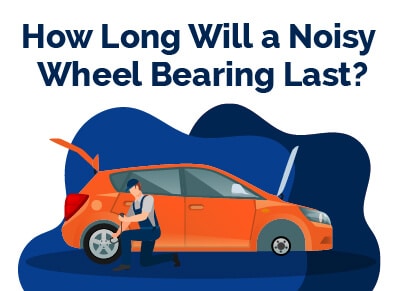How Long Will A Wheel Bearing Last After It Starts Making Noise?
April 6, 2023


I am a serial entrepreneur and a consumer advocate. When I’m not helping car buyers, I love working on ventures that have a positive impact.
I run a cause marketing agency and serve on the board of Vayu Global Health where we are disrupting the medical industry and preventing the needless deaths of mothers and babies during childbirth.
The fact is that there is no one-size-fits-all rule that can speculate how long wheel bearings will last after they start making noise. But on average, a wheel bearing can last 200 – 1000 miles after it starts to make noise.
Wheel-bearing noise symptoms are usually indications of different faults in the car. They might be minor cases that will allow you to drive your car for more than 1,500 miles.
In some cases, a worn-out wheel hub assembly may cause steering problems and vehicle instability, requiring you to stop driving immediately.
Let's review key information about failing wheel bearings and the factors that affect their lifespan.
Table of Contents
- How Long Does a Wheel Bearing Last After It Starts Making Noise Video
- What Does a Wheel Bearing Sound Like When It's Going Out?
- How Long Will a Wheel Bearing Last After It Starts Making Noise?
- Does a Wheel-Bearing Noise Come and Go?
- Does Wheel Bearing Noise Stop When Braking?
- How Expensive Is It To Replace a Wheel Bearing?
- Can I Change Just One Wheel Bearing or Replace Both Wheel Bearings at the Same Time?
- How Long Can I Drive on a Noisy Wheel Bearing?
- What Happens if You Keep Driving on a Bad Wheel Bearing?
- Summary
- Best Car Deals by Category
How Long Does a Wheel Bearing Last After It Starts Making Noise Video
What Does a Wheel Bearing Sound Like When It's Going Out?
A wheel bearing will make different kinds of sounds when it is going out. These sounds act as indicators to tell you what exactly is wrong with the wheel bearing.
When a wheel bearing is going out, you should hear sounds like a growling noise, clicking sounds, and humming sounds. In some cases, the sounds from your wheel bearing indicate that they need lubrication.
But when the sounds persist and become even louder, you should pay close attention and diagnose the fault before something tragic happens.
How Long Will a Wheel Bearing Last After It Starts Making Noise?
As I stated earlier, a wheel bearing will last up to 1,000 miles after it starts making noise. The noise symptoms in your wheel bearings are indications that they are failing. The problem is that these noise symptoms are multiple indications of different faults.
In some cases, driving with a failing wheel bearing is entirely unsafe. But if your wheel bearing just started making noise, there is a slight chance that the damage is severe.
You can continue driving with the noisy wheel bearing till you create some space to diagnose the wheel bearing noise symptoms and fix it as soon as you can.
To determine how long your wheel bearing will last after it starts making noise, you must consider the factors causing it.
Does a Wheel-Bearing Noise Come and Go?
Yes. A wheel-bearing noise comes and goes. Sometimes, the wheel bearing noise disappears momentarily, and other times, it becomes louder.
Many factors contribute to the noise intensity from your wheel bearing, such as speed, lubrication, wrong installation, unbalanced tires, or a failing wheel bearing.
In some cases, the wheel-bearing noise starts when you are on a bad/rough road, only to disappear after you’ve left the rough terrain. You must not relax when you notice a disappearing wheel bearing noise. You have to figure out what’s wrong and effect changes.
Does Wheel Bearing Noise Stop When Braking?
Yes, the wheel bearing noise slightly stops when you hit the brakes. This is because the wheel bearings are no longer in motion.
Failing wheel bearings make noise when the wheels are in motion. Changes in speed levels or direction can make the wheel-bearing noise momentarily go away. If this happens, you should not be too quick to assume that your bearings are now perfectly okay.
How Expensive Is It To Replace a Wheel Bearing?
The average cost of replacing a wheel bearing is between $150 - $350. The prices might shoot up to $500, depending on the level of damage to your wheel hub assembly. Wheel bearings are always less expensive to replace.
However, the cost of replacing is determined by whether you will change the entire hub or just the bearings.
Can I Change Just One Wheel Bearing or Replace Both Wheel Bearings at the Same Time?
There’s nothing wrong with changing one wheel bearing if the other wheel bearings are good. You don’t need to replace both wheel bearings at the same time.
Before changing your wheel bearings, you want to know the number of bad bearings you have.
After confirming that you have just one bad wheel bearing, go ahead and fix that. One bad wheel bearing wouldn’t cause both wheel bearings to fail. You will only accumulate extra costs trying to fix both.
How Long Can I Drive on a Noisy Wheel Bearing?
You can only drive on a noisy wheel bearing for 1,000 miles. We will strictly advise that you should not try to exceed this limit. It is entirely unsafe to do so.
Noise is a major symptom of a failing wheel bearing, and a failing wheel bearing can only last for up to 1,000 miles. Trying to push your vehicle beyond this limit will pose a great danger to yourself, the car, and other road users.
Continual stress on the failing wheel bearing will cause increased tire wear and axle damage and can also spoil your wheel hub, CV joint, and transmission.
What Happens if You Keep Driving on a Bad Wheel Bearing?
If you keep driving on a bad wheel bearing, you will damage your CV joint and transmission. It is hazardous to drive on a bad wheel bearing. You are putting yourself at risk of losing control of your vehicle if you’re at full speed.
There are chances that you will experience a broken axle and an inability to keep the car steady. Driving on a bad wheel bearing makes it easy to run off the road, but hopefully not into an oncoming vehicle or a stable object down the street.
A collision with such an impact is not an experience that you will love to have.
Summary
Remember to address wheel-bearing issues promptly. Stop and check your car whenever you notice unusual symptoms in your wheel bearings. Ignoring these symptoms can lead to further damage to your car.
If your wheel bearing has just started making noise, you may have a short period before repairs are critical, but it's essential to replace them soon.
Best Car Deals by Category
Posted in Car Buying Tips, Car Troubleshooting |





